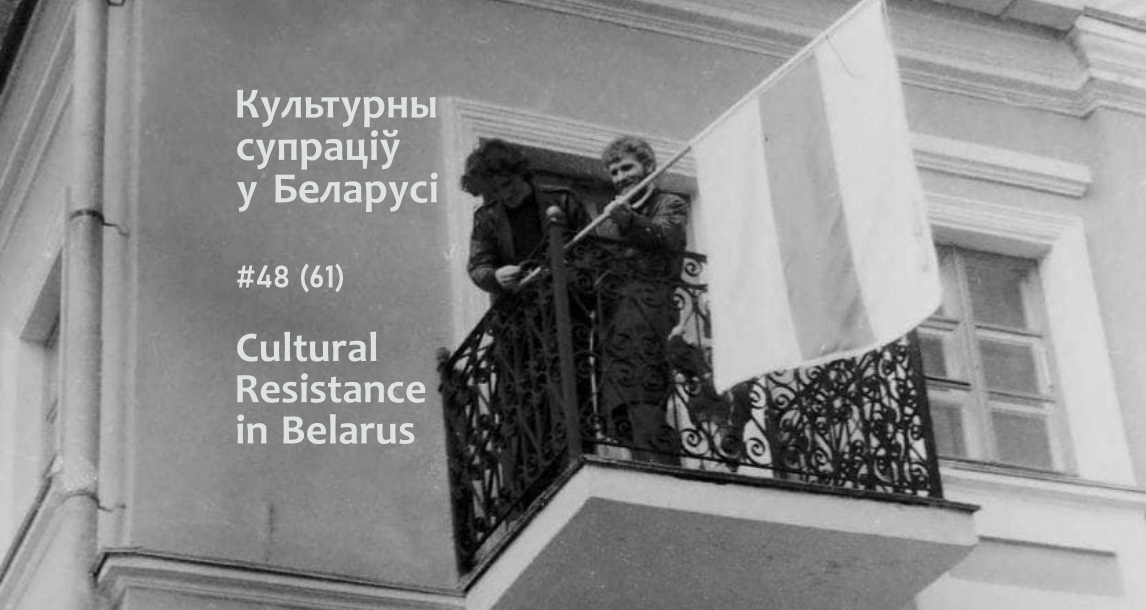
Download the pdf-version of issue 61 of Cultural Resistance Monitoring
Persecution, Convictions, Censorship, Cultural Policy

Media reports on purges in cultural institutions all over Belarus: more than 150 fired from the Belarusian State Philharmonic, Historical Museum, National Library, National Academic Bolshoi Opera and Ballet Theatre, Academy of Arts, State Museum of the History of Belarusian Literature, The Yakub Kolas National Academic Drama Theatre, Hrodna Regional Puppet Theater and other organizations. There is information about the existence of lists for mass dismissals, which are kept secret. People are fired under various dates and for different formal reasons, in order to hide the purge.
Uładzimir Bułaŭski, a well-known activist and organizer of cultural events in Viciebsk, detained on November 26, got 7 days in prison. He was released on December 1.

The adventure film Adventures of Pranciš Vyrvič based on the work of Ludmiła Rubleŭskaja has disappeared from cinemas in Belarus. The film stars several Kupałaŭcy troupe actors who left the theater in protest in 2020 .
Iryna Silvanovič, head of the exhibition hall in Hrodna, who supported the protests in 2020, was fired.
Fiodar Čarankoŭ, vocalist of the Nia Varta band, was fired from the Mazyr Oil Refinery after 8 years of work. The musician was sentenced to 5 days for following an “extremist” media resource, contracted coronavirus in jail, and was hospitalized after his release. Upon his recovery, Fiodar came to work, but he was told that he had been fired because of the administrative arrest.
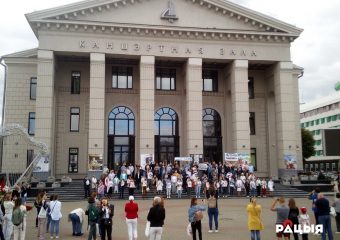
The Yellow Stars concert in memory of the Holocaust victims, scheduled for January 20 and 22 at the Belarusian State Philharmonic, was canceled after a delation of the “indifferent” citizen. Someone named Ivan Nikifaraŭ wrote that “The so-called “projects” are presented as charity events, but in fact the funds go to support opposition organizations (for example, the Hrodna Hospice), moreover, they employ artists who take part in opposition rallies.”
Pavieł Biełavus, the founder of the Art Siadziba cultural platform and a souvenir shop Symbal.by, was not released after 15 days of arrest, his release due on December 3 at 3:40 p.m. Pavieł‘s relatives have no information why he is still being held captive.
Life of the Imprisoned People

Alaksiej Minaŭ, a political prisoner, writer and teacher of the Belarusian language and literature, wrote a poem when he saw Volha Załatar, a political prisoner, activist and a mother of many children, in the corridors [presumably, at court], who vigorously and cheerfully wished a good morning to everyone in Belarusian and smiled. The poem has the lines “Remember, it will pass very quickly, and know, someone is breathing in your laughter.”
Mikoła Papieka, a poet, politically imprisoned under the “karahod” case, sent a new poem from behind bars and told that he works in a nursery, misses his friends and his beehive.
Dissent and Cultural Activism
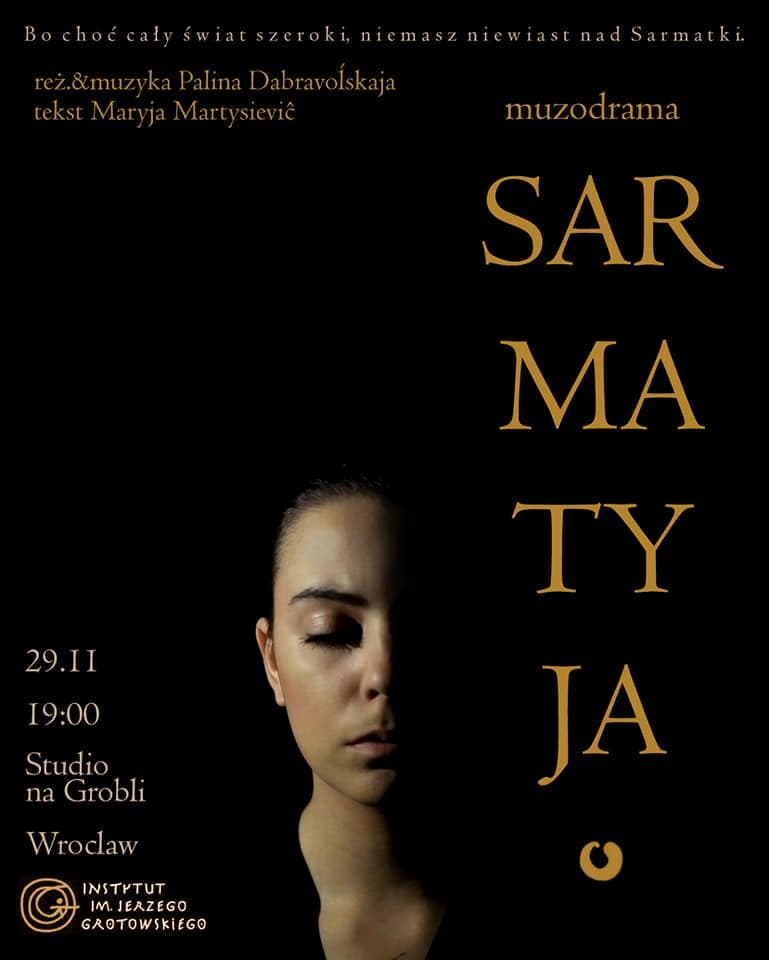 A musical performance by Palina Dabravolskaja, a Belarusian actress, director and musician, based on Maryja Martysievič’s book Sarmatia, took place in Wroclaw, Poland. Folk music and hip-hop are combined in the performance about the tragic history of the impossibility to find a home abroad.
A musical performance by Palina Dabravolskaja, a Belarusian actress, director and musician, based on Maryja Martysievič’s book Sarmatia, took place in Wroclaw, Poland. Folk music and hip-hop are combined in the performance about the tragic history of the impossibility to find a home abroad.
A meeting with Andrej Januškievič, head of the Januškievič publishing house, about the specifics of the book publishing house work in Belarus and modern Belarusian literature took place on November 22 in the Vieršy space in Minsk.

Pavał Mažar‘s The Handbook film about tortures during the Belarusian protests was recognized as the best short film at the world’s most authoritative IDFA documentary film forum in Amsterdam.
The Belarusian Council for Culture has launched a charity Christmas auction, where you can buy a new painting with cats by Volha Jakuboŭskaja dedicated to all Belarusians.
Lavon Volski, a legendary Belarusian musician, will give a tour in Poland.
Alaksiej Pałujan‘s film Courage about last year’s protests in Belarus qualified for the Academy Awards in the category of best feature-length documentaries.
Kupałaŭcy, a troupe of the Janka Kupała National Theater, that resigned in 2020 after the rigged elections, announced the premiere of their first play of the second season – Notes of a Red Army Officer directed by Mikałaj Pinihin based on the novel of the same name by Siarhiej Piasiecki. The first show took place on December 4, 2021 in Krakow, Poland, as part of the Boska Komedia festival.
An online exhibition MADE IN BELARUS / MADE OF PAIN about Belarus in the post-election period of 2020 has been launched. The author of the project is Alaksandr Suščeŭski, photographer and director.
Voices of Belarusian Culture

Andrej Kuciła, Belarusian documentary filmmaker, the author of the film When Flowers Are Not Silent about the heroines of the Belarusian protests, which became the best documentary at the Warsaw Film Festival, shared in an interview,
“I have never cried so much over my own material as over the videos from the protests. I have no particular disappointment today, since I had no illusions. On the contrary, I am inspired: we have no right to say so, because there are victims, but in terms of determining who we are and where we are heading, the situation is better than if we lived like this for twenty years more. And it is much better than it was.”

Alina Koŭšyk, one of the founders of the Center for Belarusian Solidarity in Warsaw,
“It is important for everything to be there, to be alive, for the Belarusian life to flourish! The Belarusian wave has become visible, and it’s great. I notice that we, Belarusians, here in Warsaw, have united, started feeling a part of the whole and for most of the people our culture has become interesting. A Belarusian event is not necessarily a rally with white-red-white flags, it can be an exhibition, a concert, a courtyard party or a mundane meeting over a cup of coffee. Belarusianness is manifested in everything.”

Dźmitryj Šymanski, a bagpiper from the Javaryna band, who was sentenced to three years of open air prison for playing bagpipe on the protest rally on August 16, 2020, but managed to flee,
“While in jail, I was able to make a wind instrument: there were such narrow cylindrical jars from vitamins and I collected six of them, connected them, cut holes and made an improvised kaval [shepherd’s flute, an instrument common in Asia and Southeastern Europe]. It’s a violation [of prison order], but I would quietly play it sometimes.
I will return to Belarus 100%. The belief in changes has not disappeared – they will happen, perhaps, not that quickly. But they will.”
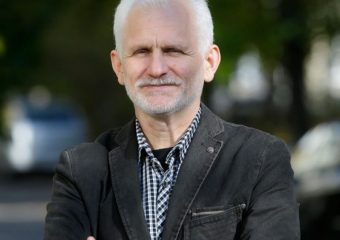
In jail, Aleś Bialacki, a member of PEN Belarus, human rights activist and political prisoner, writes memoirs of his time as the head of the Maksim Bahdanovič Literary Museum in 1989-1998,
“One can go on and on about Maksim Bahdanovič’s love lyrics, there would be enough for a tour. I memorized these poems, created under the influence of feelings for Anna Kakujeva, at the age of 17, when I discovered Bahdanovič’s poetry. Later I read them during excursions in the fourth hall of the museum called Women in the Life of Maksim Bahdanovič. I am moved by them even now, as I sit on the bunk reading a tattered volume of poems by Maksim Bahdanovič from 1968 with some pages torn off and look at the tower of Piščałaŭ Castle shining white in the sun.”

Taćciana Niadbaj, chair of PEN Belarus, spoke about mass purges in cultural institutions,
“As of December 1, we have learned about more than 100 names of cultural figures who have been fired or forced to leave after years or decades of work. And this is just the beginning of recording data on the avalanche of layoffs, sometimes there are almost a hundred people fired at just one institution. The scale is shocking. There is information about the existence of lists for mass dismissal of employees of cultural institutions. Naturally, these materials are kept secret; people are fired under various dates and for different reasons. So to speak, they cover up the purge, because if one just fires all the dissatisfied in December, one can make even the quiet museum workers protest.”
Maryja Kaleśnikava, activist, musician, political prisoner, talked about what she would like to do when she is free,
“I have a lot of ideas for music and cultural projects. For example, I would like to turn the pre-trial detention center into a cultural center, create a space, a museum of victims of communism, totalitarianism and other “isms”. And a social project: a center for the socialization and rehabilitation for women after imprisonment.”
International Solidarity
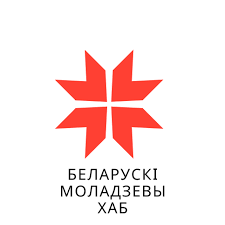 The International PEN demands the immediate and unconditional release of Aleś Bialacki and Uładzimir Mackievič, members of PEN Belarus and political prisoners.
The International PEN demands the immediate and unconditional release of Aleś Bialacki and Uładzimir Mackievič, members of PEN Belarus and political prisoners.
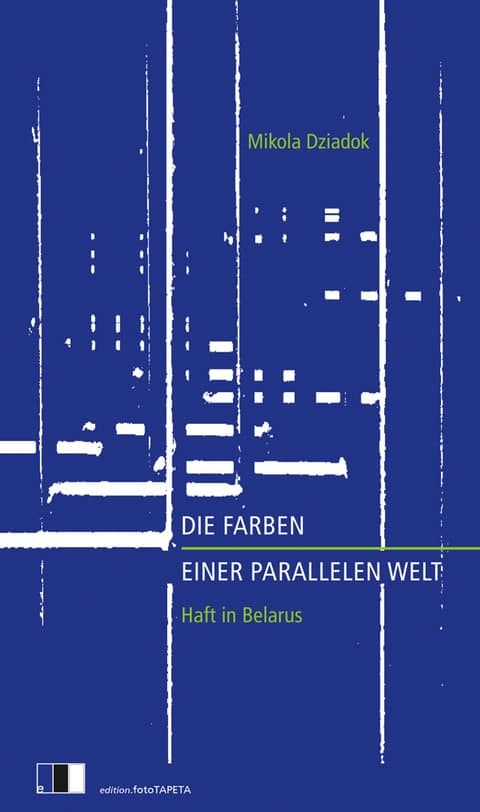
A Belarusian Youth Hub has opened in Warsaw, Poland. Now there are Belarusian language courses MOVA Nanova, rehearsals of Teatr TuT and Warsaw Freedom Orchestra, as well as shows of the Revolution art project.
Aksimiron, rap musician from Russia, mentioned the political situation in Belarus in the lyrics of his new track Window to Paris, “Blessed are the poor in spirit” – so teaches us the Holy Scripture. Putin wears Celine, Lukashenka wears Margiela.
Vitold Ašurak, a political prisoner who died behind bars, was posthumously awarded the Ukrainian Cross for “Dignity in captivity”. Less than 100 people have received this award during its entire existence.
The book Colours of a Parallel World by Mikoła Dziadok, a political prisoner, writer and blogger, was published in German. In this book, Dziadok talks about how the Belarusian penitentiary system destroys one’s personality.
Political Prisoners’ Birthdays
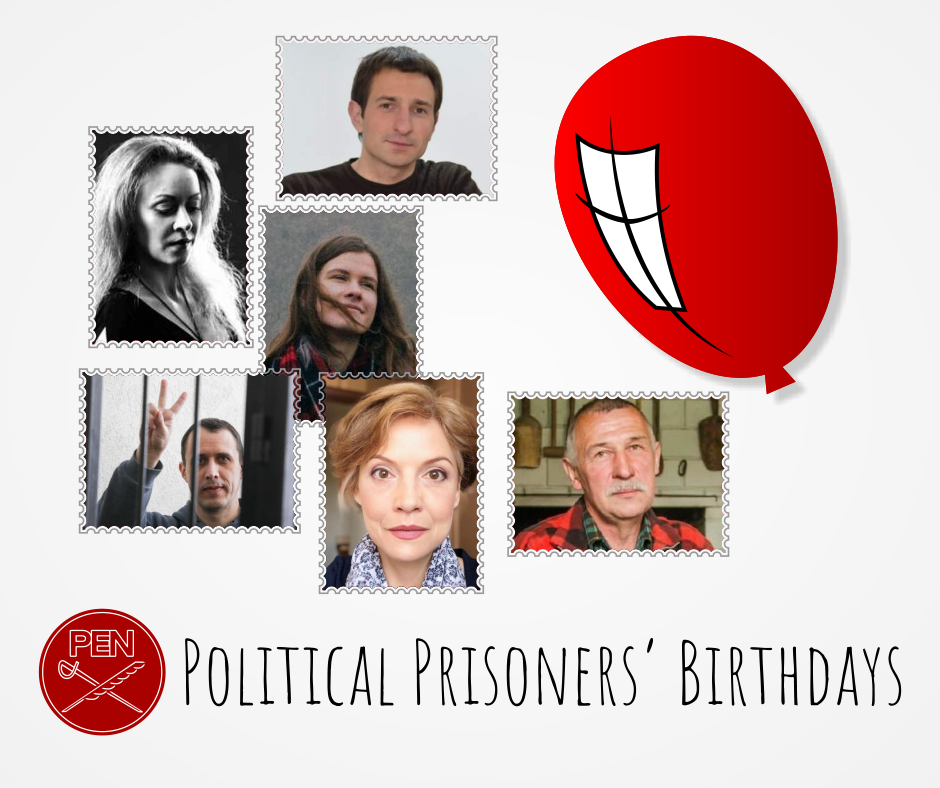
For December 5, 896 persons have been recognized as political prisoners in Belarus, and the number has been increasing steadily.
PEN Belarus, as an association of writers, is particularly concerned about the fate of cultural workers who have been unjustly imprisoned. In December, 6 political prisoners somehow involved in the process of cultural development of our country, will celebrate their birthdays behind bars. They are:
Ksienija Syramałot, poet and student (December 19); Alaksandr Hałkoŭski, Research Fellow at the Center for the Study of Belarusian Culture, Language and Literature of the National Academy of Sciences of Belarus (December 24); Mikoła Papieka, poet and beekeeper (December 28); Valeryja Kaściuhava, political scientist and analyst, editor and author of the Belarusian Yearbook (December 30), Pavieł Sieviaryniec, writer, co-founder of the Belarusian Christian Democracy party (December 30) and Mija Mitkievič, cultural manager (December 31).
Congratulate the political prisoners on their birthdays and the coming New Year with a postcard or letter (in Belarusian or Russian), which can be sent to the following addresses:
Ksienija Syramałot (Ксенія Сырамалот) and Mija Mitkievič (Мія Міткевіч): ПК №4. 246035, г. Гомель, вул. Антошкіна, 3;
Alaksandr Hałkoŭski (Аляксандр Галкоўскі): Папраўчая ўстанова адкрытага тыпу №9. 210034, г. Віцебск, вул. 3-я Чэпінская, 39;
Mikoła Papieka (Мікола Папека): Папраўчая ўстанова адкрытага тыпу №21. 247760, г. Мазыр, бульвар Юнацтва, 24;
Valeryja Kaściuhava (Валерыя Касцюгава): СІЗА-1. 220030, г. Мінск, вул. Валадарскага, 2;
Pavieł Sieviaryniec (Павел Севярынец): ПК №17. 213004, г. Шклоў, вул. 1-я Заводская, 8.
